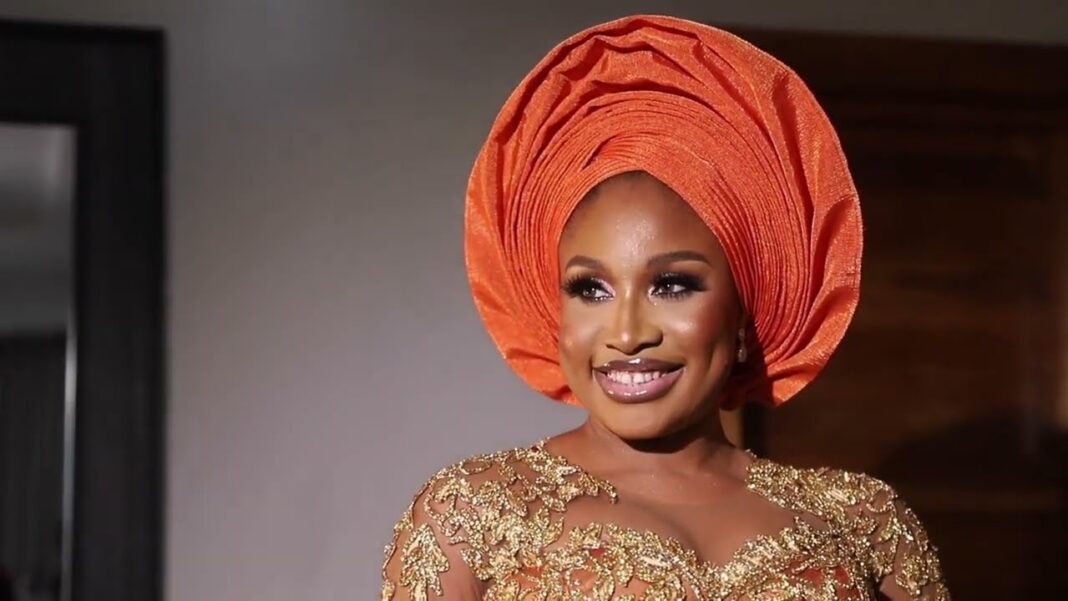Traditional weddings in Nigeria are a grand and vibrant celebration of love, culture, and family. With over 250 ethnic groups, each with their unique customs and traditions, Nigerian traditional weddings are a sight to behold. From the elaborate attires to the symbolic gifts and rituals, every aspect of a traditional wedding is steeped in tradition and meaning.
In this comprehensive guide, we will take a closer look at the top 10 highlights of Nigerian traditional weddings that make them truly special and one of a kind.
Traditional Attire and Dress Code
The attire and dress code for a traditional Nigerian wedding are perhaps the most visually striking aspect of the celebration. Each region has its own traditional attire, but some elements remain common throughout the country.
The Bride’s Outfit
In most Nigerian cultures, the bride wears a traditional outfit called a “iro and buba.” This consists of a wrapper (iro) worn around the waist and a blouse (buba) worn on the upper body. The fabrics used for the iro and buba are usually bright and colorful, with intricate patterns and designs. The bride may also wear a headpiece or gele made from the same fabric as her outfit.
In some regions, such as the Yoruba culture, brides also wear a “gele,” which is a long, flowing material wrapped around the waist and shoulder to create a regal and elegant look.
The Groom’s Attire
The groom’s traditional attire typically consists of a “agbada,” which is a long, flowing robe, and a “fila,” which is a cap made from the same fabric as the agbada. The agbada is usually adorned with intricate embroidery and can be made from various materials such as cotton, silk, or even lace.
In some cultures, the groom may also wear a “buba” (blouse) and “sokoto” (trousers) made from the same fabric as the agbada.
The Dress Code for Guests
The dress code for guests at a traditional Nigerian wedding is usually colorful and vibrant. Women often wear traditional outfits such as iro and buba, aso ebi (a matching outfit worn by a group of friends or family), or elegant lace dresses. Men typically wear traditional attire such as agbada or modern suits in bright colors and patterns.
The Role of the Bride Price

In Nigerian culture, the bride price plays an important role in traditional weddings. It is seen as a gesture of appreciation and respect towards the bride’s family and is usually paid by the groom’s family. The amount of the bride price varies depending on the culture and region but can include monetary gifts, livestock, and other valuable items.
The Significance of the Bride Price
The bride price is not just a financial transaction but also symbolizes the groom’s commitment to taking care of his bride and her family. It is also a way for the two families to come together and establish a bond before the wedding.
Negotiating the Bride Price
In some cultures, the bride’s family may negotiate the bride price with the groom’s family. This is done to showcase the value and importance of the bride to her family and community. It is also seen as a way for the groom’s family to prove their love and dedication to the bride.
Pre-Wedding Rituals and Customs

Traditional Nigerian weddings are not just a one-day event; they involve many pre-wedding rituals and customs that are important to the couple and their families. These rituals are usually meant to bring good luck, blessings, and protection to the couple.
Introduction Ceremony
The introduction ceremony, also known as “ikuaka,” is the first step in the traditional wedding process. It is a formal meeting between the two families where the groom’s family presents gifts to the bride’s family as a sign of their intention to marry their daughter.
Traditional Wedding Invitation Cards
In many Nigerian cultures, traditional wedding invitation cards are sent out to family and friends before the wedding. These invitations usually include details about the date, time, and location of the wedding, as well as any dress code or theme for the event.
Bridesmaids and Groomsmen
Bridesmaids and groomsmen play an important role in Nigerian traditional weddings. In some cultures, bridesmaids may be responsible for preparing the bride’s hair and makeup, while groomsmen may accompany the groom during pre-wedding rituals and ceremonies.
The Traditional Engagement Ceremony
The traditional engagement ceremony, also known as “igba nkwu” or “igbankwu,” is the main event of a traditional Nigerian wedding. It involves the exchange of vows, rings, and traditional gifts between the bride and groom, as well as blessings from family members and community elders.
The Kola Nut Ceremony
The kola nut ceremony is an essential part of the traditional engagement ceremony. The kola nut, which is considered a symbol of hospitality and friendship, is presented to the couple by the groom’s family as a sign of their acceptance and willingness to marry into the bride’s family.
Exchange of Gifts
During the traditional engagement ceremony, both families exchange gifts as a way to show appreciation and build a bond. The bride’s family may present gifts such as jewelry, clothes, and household items to the groom’s family, while the groom’s family may give the bride money, livestock, or other valuable items.
Blessings from Elders
Elders and community leaders play a significant role in traditional Nigerian weddings. They offer prayers and blessings to the couple, advise them on marriage and family life, and serve as witnesses to the union.
Symbolic Wedding Gifts and Items
In Nigerian traditional weddings, symbolic gifts and items are exchanged between the couple and their families. These gifts hold deep cultural and religious significance and are believed to bring blessings, prosperity, and protection to the newlyweds.
Kolanut and Palm Wine
Kolanut and palm wine are commonly used in traditional Nigerian weddings as a symbol of hospitality and friendship. The bride and groom may share a kola nut and drink palm wine together as a way to seal their love and commitment to each other.
Traditional Fabrics and Jewelry
Traditional fabrics such as ankara, adire, and aso oke play an important role in Nigerian traditional weddings. They are often given as gifts to the couple or worn by the bride and groom during the wedding ceremony. Traditional jewelry, such as coral beads and brass cuffs, are also popular gifts for the bride.
Salt and Water
In some cultures, salt and water are presented to the couple as a symbol of purity and cleansing. The couple may take a sip of the water and sprinkle some salt on their tongues as a way to purify themselves before starting their new life together.
Cultural Music and Dance Performances
Music and dance are an integral part of Nigerian culture, and they play a significant role in traditional weddings. Traditional songs and dances are performed to celebrate the union of the couple, entertain guests, and pay homage to the couple’s heritage.
Drumming and Singing
Drumming is an essential element of traditional Nigerian music and is often accompanied by singing and dancing. Different drums have different meanings and are played during different parts of the wedding ceremony.
Dancing Processions
Dancing processions are a common sight at Nigerian traditional weddings. The bride and groom, along with their families and friends, may perform a traditional dance as they make their way to the wedding venue.
The Significance of Traditional Foods and Feasting
Food plays a central role in Nigerian culture and is an important part of traditional weddings. Traditional dishes are prepared with care and served to guests as a sign of hospitality and abundance.
Jollof Rice
Jollof rice is a popular dish at Nigerian weddings and is often the star of the feast. It is usually made with rice, tomatoes, onions, peppers, and various spices and can be served with chicken, beef, or fish.
Pounded Yam and Egusi Soup
Pounded yam and egusi soup are also common dishes at Nigerian traditional weddings. Pounded yam is made by pounding boiled yams into a smooth and fluffy paste, while egusi soup is a rich and flavorful stew made with melon seeds, vegetables, and meat or fish.
Pepper Soup
Pepper soup, a spicy broth made with different meats, vegetables, and spices, is another staple at Nigerian weddings. It is believed to have medicinal properties and is often served as an appetizer.
Family Roles and Responsibilities
In Nigerian culture, family plays a vital role in traditional weddings. Each family member has specific roles and responsibilities during the wedding ceremony, and these duties are taken very seriously.
The Role of Parents
Parents of the bride and groom are highly respected in Nigerian culture and play an essential role in the wedding. They may help with planning and organizing the event, provide guidance to the couple, and offer blessings and prayers for their marriage.
The Importance of Siblings
Siblings also play a crucial role in Nigerian traditional weddings. Sisters of the bride may serve as bridesmaids or help with the bride’s attire, while brothers of the groom may act as groomsmen or assist with pre-wedding rituals.
Post-Wedding Celebrations and Traditions
The celebration of a traditional Nigerian wedding does not end after the main ceremony. There are several post-wedding traditions and celebrations that take place, each with its own significance and meaning.
The Bridal Parade
The bridal parade is a traditional post-wedding celebration where the bride is paraded around the community or town in her wedding attire. This is a way for the couple to showcase their love and happiness to their community and receive blessings from elders and well-wishers.
Honeymoon and Traditional Marriage Blessings
After the wedding, the newlyweds may go on a honeymoon, usually to a nearby city or town. Once they return, they may receive blessings and good wishes from family members and friends who were unable to attend the wedding.
Conclusion
Nigerian traditional weddings are truly a celebration of love, culture, and community. From the elaborate attires and symbolic gifts to the colorful music and dance performances, every aspect of a traditional wedding holds deep meaning and significance. By understanding these top 10 highlights of Nigerian traditional weddings, we can appreciate the rich cultural heritage and traditions of this beautiful country.

